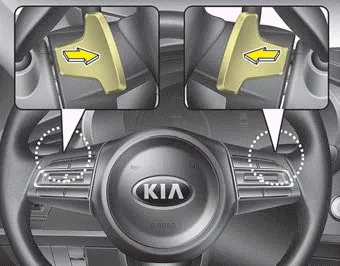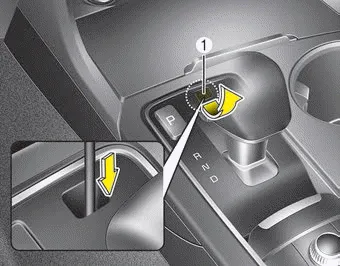Kia Stinger CK: Automatic transmission (shift-by-wire) / Automatic transmission operation
Contents:
The automatic transmission has 8 forward speeds and one reverse speed.
The individual speeds are selected automatically in the D (Drive) position.
WARNING
To reduce the risk of serious injury or death:
- ALWAYS check the surrounding areas near your vehicle for people, especially children, before shifting a vehicle into D (Drive) or R (Reverse).
- Before leaving the driver’s seat, always make sure the shift lever is in the P (Park) position, then set the parking brake, and place the engine start/stop button in the OFF position. Unexpected and sudden vehicle movement can occur if these precautions are not followed.
- Do not use engine braking (rapidly shifting from a high gear to lower gear) on slippery roads. The vehicle may slip causing an accident.
Transmission ranges ➤
Paddle shifter (Manual mode)

The paddle shifter is available when the shift lever is in the D (Drive) position.
Pull the [+] or [-] paddle shifter once to shift up or down one gear and the system changes from automatic mode to manual mode.
When the vehicle speed is lower than 7 km/h (4.3 mph), if you don't press the accelerator pedal for more than 6 seconds. (Except drive mode (SPORT, CUSTOM)). For more information, refer to Drive mode integrated control system in chapter 5 or if you shift the shift lever from D (Drive) to manual mode and shift it from manual mode to D (Drive) again or if you pull the [+] paddle shifter more than 1 second, the system changes from manual mode to automatic mode.
✽ NOTICE
If the [+] and [-] paddle shifters are pulled at the same time, gear shift may not occur.
Shift-lock system
For your safety, the automatic transmission has a shift-lock system which prevents shifting the transmission from P (Park) into R (Reverse) or D (Drive) unless the [UNLOCK] button is pressed while depressing the brake pedal.
To shift the transmission from P (Park) into R (Reverse) or D (Drive):
1. Depress and hold the brake pedal.
2. Start the engine or place the engine start/stop button in the ON position.
3. Move the shift lever to R (Reverse) or D (Drive) while pressing the [UNLOCK] button.
When the battery is discharged

You can move the shift lever, when the battery is discharged. However, it will not change the gear from P (Parking) to N (Neutral) or others. In emergencies, do the following to move the shift lever to N (Neutral) on a level ground.
1. Connect the cables between the jump-starting terminals inside the engine compartment and the battery terminals of another vehicle/ supplementary battery. For more information refer to "Jump Starting" in chapter 6.
2. Release the parking brake with the engine start/stop button in the ON position.
3. Press the engine start/stop button to the OFF position.
4. Remove the cap-cover (1) and insert a tool (e.g. flathead screwdriver) into the access hole and press down on the tool while depressing the brake pedal. Then, the gear will change to the N (Neutral) position. It should be pressed within 3 minutes after turning OFF the engine.
✽ NOTICE
In situations where the gear needs to be changed from P (Park) to N (Neutral) when the engine start/stop button is in the OFF position, refer to step 4.
The actuators work to shift the gear into the N (Neutral) or P (Parking) and make a normal mechanical sound.
Other information:
Kia Stinger (CK) 2018-2023 Owner's Manual: Floor Carpet
Components and components location Component Location 1. Floor carpet assembly Repair procedures Replacement Put on gloves to protect your hands. • Use a plastic panel removal tool to remove interior trim pieces without marring the surface.Kia Stinger (CK) 2018-2023 Owner's Manual: Rear Stabilizer Bar
Repair procedures Removal 1. Remove wheel nuts, wheel and tire (A) from hub. Tightening torque: 107.9 - 127.5 N·m (11.0 - 13.0 kgf·m, 79.6 - 94.0 lb·ft) Be careful not to damage the wheel bolts when removing the wheel and tire (A).Categories
- Manuals Home
- Kia Stinger Owners Manual
- Kia Stinger Service Manual
- New on site
- Most important about car


